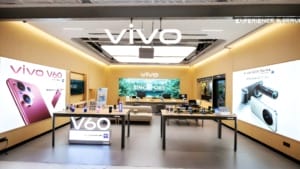Samsung chip profits fall sharply due to US export controls and price drops
Samsung chip profits dropped 40% due to US export rules and price cuts as the company raced to catch up in AI memory production.

Samsung Electronics has reported a steep profit drop from its chip business as export restrictions and falling prices continue to pressure its core operations. Despite an overall recovery in tech demand, these challenges have made it difficult for the South Korean tech giant to keep pace in the highly competitive artificial intelligence (AI) memory market.
Table Of Content
Chip profits down as export rules hit sales
In the first quarter of the year, Samsung’s chip division saw its operating profit fall by around 40%. According to an official statement, the company earned 1.1 trillion won (US$770 million) from its chip segment. This decline was mainly due to lower average selling prices and a decrease in sales of high-bandwidth memory (HBM) chips, which were affected by US export controls.
Some of Samsung’s customers also held back on placing new orders, instead waiting to release its upgraded HBM3E memory products. Although there was a brief lift in sales as Chinese clients rushed to stockpile chips ahead of expected US tariffs, this wasn’t enough to offset the overall decline.
Greg Noh, an analyst at Hyundai Motor Securities, explained that while Samsung plans to boost production of its 12-layer HBM3E chips in the second quarter to meet demand, real progress will only come if major buyers like Nvidia place orders. “Without Nvidia’s backing, a strong rebound is hard to imagine,” he said.
Race to catch up in AI memory
Samsung is still struggling to secure approval from Nvidia for its most advanced high-bandwidth memory chips. These chips play a key role in AI systems and are currently the most profitable type of memory product. Rival firm SK Hynix, also based in South Korea, continues to lead the market in this area.
The effort to narrow the gap is proving costly. Samsung spent 9 trillion won on research and development during the first quarter—16% more than it spent in the same period last year. This large investment is putting additional strain on its overall earnings.
Even so, Samsung did benefit from a rise in global demand for PC memory and smartphones. Shipments by companies like Apple and Lenovo increased early in the year as they rushed to avoid potential new tariffs in the United States. Samsung’s own Galaxy S25 smartphone series also contributed to stronger overall sales. As a result, the company posted a net income of 8.03 trillion won for the quarter, beating analysts’ expectations.
However, the company warned that these gains may not continue. In a statement, Samsung said that ongoing global trade tensions make it hard to predict future results. Still, it hopes things will improve in the second half of the year if uncertainty around trade policies decreases.
Foundry business faces tough road ahead
Samsung’s chipmaking troubles don’t end with memory chips. Its contract chip manufacturing division has also had a tough quarter. With fewer large orders from major clients, it has struggled to compete with Taiwan Semiconductor Manufacturing Company (TSMC), which remains the market leader.
According to research firm TrendForce, TSMC held nearly two-thirds of the global market share for chip foundries in the third quarter of 2024. Samsung’s share was just 9.3%.
Now, Samsung is turning its attention to a new chapter in chip production. The company is preparing to begin mass production using its advanced 2-nanometer process in the June quarter. This is a crucial step in its plan to catch up with TSMC and win a larger share of the high-end logic chip market.
















